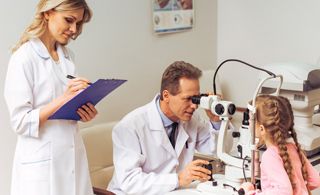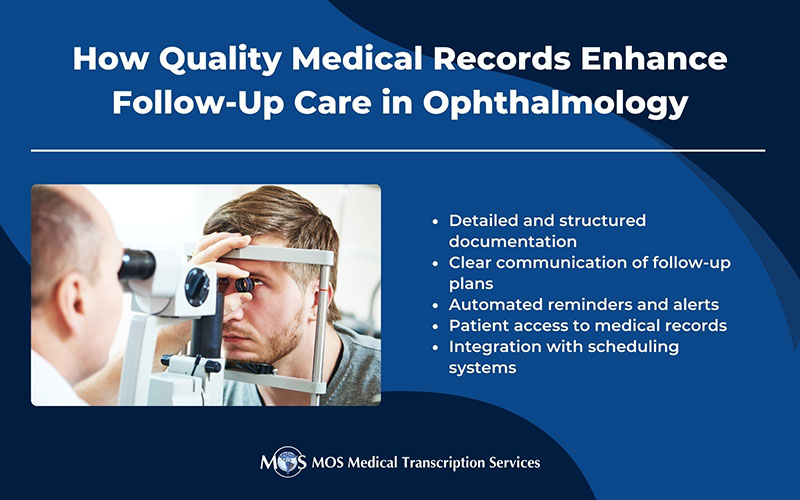 Medical transcription companies offer their services to ophthalmologists that help them maintain accurate medical records for patients with medical or surgical eye problems. Accurate medical documentation facilitates higher quality care and improved clinical outcomes. Like any other speciality physician, an ophthalmologist also records facts regarding a patient like their personal details, medical history, medications, allergies etc. At the time of patient encounter, ophthalmologists can dictate patient information using a toll free number, digital recorder, conference call recording or even a mobile phone and with the help of a transcription service provider or via in-house transcription these recordings can be transcribed into accurate medical records. This in turn improves workflow, facilitates better care co-ordination and improves the quality of patient care apart from proving to be helpful at the time of an audit.
Medical transcription companies offer their services to ophthalmologists that help them maintain accurate medical records for patients with medical or surgical eye problems. Accurate medical documentation facilitates higher quality care and improved clinical outcomes. Like any other speciality physician, an ophthalmologist also records facts regarding a patient like their personal details, medical history, medications, allergies etc. At the time of patient encounter, ophthalmologists can dictate patient information using a toll free number, digital recorder, conference call recording or even a mobile phone and with the help of a transcription service provider or via in-house transcription these recordings can be transcribed into accurate medical records. This in turn improves workflow, facilitates better care co-ordination and improves the quality of patient care apart from proving to be helpful at the time of an audit.
Ophthalmologists need to conduct eye exams to detect damages to the eye, even those caused by underlying health conditions.
- A diabetes patient may have developed eye problems such as glaucoma, cataract and diabetic retinopathy. These are revealed in an eye exam.
- People with high blood pressure are also often asked to test their eyes to identify whether any damage has been caused to the small blood vessels.
- Non-invasive eye exams can detect symptoms of Alzheimer’s disease such as changes in how retinal blood vessels respond to light, presence of beta-amyloid proteins and decreased retinal thickness.
- Multiple sclerosis or MS can often be detected clearly during an eye test through field vision analysis.
In addition, eye exams are advised for conditions such as arthritis, tumours, and high cholesterol.
Consultation, diagnosis and treatment of any of these conditions will involve considerable note preparation. The easy way for ophthalmologists is to dictate their observations and findings and have the entire recording transcribed either in real time or within their required turnaround time by a professional medical transcription firm. The advantage of this method is that they get to focus more on their patients and also ensure patient satisfaction.
SOAP Notes for Ophthalmologists
Just like other physicians, ophthalmologists need to maintain SOAP notes that record all the information about the patient. Medical transcription providers can provide accurate and timely SOAP notes. Each section of the soap notes include information that is categorized into different parts:
- Subjective: This part includes subjective observations that a patient verbally expresses such as blurred vision, eye redness, eye pain etc and it also includes basic information about the patient.
- Objective: This includes objective observations like what a patient can see, vital signs, temperature etc. It also includes basic ocular history like surgeries, previous traumas to the eyes including severity, use of contact lens, vision and so on.
- Assessment: This part of the notes includes the condition of the patients and a clear diagnosis.
- Plan: The last part of the note refers to how the physician is going to manage the problem. It may involve ordering of additional tests, treatment, medication, and surgery if required. It also includes self care and deposition like bed rest etc.
Ophthalmologists using electronic medical records can also utilize the service of a medical transcription service provider to speed up documentation. In this case, they would provide EHR integrated Ophthalmology transcription via secure HL-7 interface.
